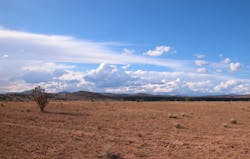The International Fund for Agricultural Development (IFAD) and the government of Djibouti signed a financial agreement to address the impact of water scarcity in rural areas of the country. The IFAD Soil and Water Management Program (PROGRES) will operate in the regions of Arta, Dikhil and Tadjourah and will cover a total of 13 rangelands, benefiting approximately 66,000 people.
"The project aims to contribute to sustainably improving living conditions and reducing poverty among rural communities and nomadic populations,” said Naoufel Telahigue, IFAD country program manager for Djibouti. “The beneficiaries will be all households having their base camps in localities within these rangelands and living under extremely precarious and climate-vulnerable conditions.”
The total cost of the project over a seven-year period is $17.05 million, including a $5.77 million IFAD loan and a $0.3 million grant. The project is being co-financed by the World Food Programme ($1.7 million), the government of Djibouti ($2.52 million) and by the beneficiaries themselves ($0.7 million). There is still a financing gap of $6.1 million.
The financial agreement was signed in Rome by IFAD President Kanayo F. Nwanze and Djibouti’s ambassador to France, Ayeid Mousseid Yahya.
Rural areas occupy most of the country’s territory and are home to 29% of the population, 67% of whom are nomadic herders. Djibouti is among the world's 10 most water-poor countries and among the 20 countries most affected by water shortages. Because of water and soil scarcity and the country’s semi-arid climate, the agriculture sector is poorly developed and crop production is minimal. Tackling the problem of water shortage is a high priority in the government’s strategy to reduce poverty and vulnerability.
The program will intensify, consolidate and complement interventions and investments from IFAD's previous program for the Mobilization of Surface Water and Sustainable Land Management by expanding existing rangelands or opening new ones. This approach aims to improve surface water collection structures and pasture restoration and regeneration.
Since 1980, IFAD has financed seven rural development programs and projects in Djibouti for a total amount of $54.4 million, with an IFAD investment of $30.1 million, directly benefiting 41,850 rural households.
Source: International Fund for Agricultural Development


